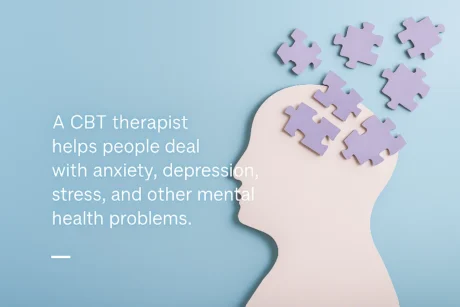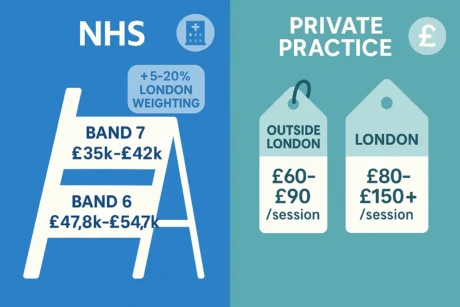No products in the basket.
Wondering what a CBT therapist earns in the UK and how it compares to other therapy roles? Knowing the therapist salary UK helps you plan your career, pick the right path and make smarter choices about NHS or private work. In the NHS, a qualified High-Intensity CBT therapist earns around £48k–£55k, with London pay adding 5–20%. Private CBT sessions usually cost £60–£120, often more in London. Now, let’s see how much a CBT therapist earns compared to other roles.
In this guide, we’ll break it all down, so you can see exactly how much CBT therapists earn in the UK, how their pay compares to other therapy roles, and what to expect in both NHS and private practice.
What Counts as a “CBT Therapist”

A CBT therapist helps people deal with anxiety, depression, stress, and other mental health problems. They do this by talking through issues and teaching simple, practical ways to manage their feelings using Cognitive Behavioural Therapy.
In the NHS, this usually means a High-Intensity CBT Therapist working in Talking Therapies services. In private practice, you might see titles like “CBT therapist” or “BABCP-accredited therapist.” Knowing this helps you understand which roles match the salaries and career paths you’re looking at.
NHS CBT Therapist Salary UK

A Band 7 CBT therapist in the NHS earns around £47,810–£54,710 in England (2025/26). However, some local job ads may show slightly different pay ranges. Extra experience or supervising others can push your pay to the top of Band 7. Plus, working in London or other high-cost areas adds 5–20% on top.
Trainee CBT therapists start at Band 6 and move to Band 7 when qualified. Overall, pay grows as you gain skills and take on more responsibility.
How to Become a CBT Therapist in UK
If you’re thinking about becoming a CBT therapist, the journey is exciting but also rewarding. First, you’ll need special training and some hands-on experience. Most courses are run by universities or approved providers and usually take around 60 days over a year. During this time, you’ll often work for a local NHS service, so you get real experience while learning.
Entry Requirements
There are a few main ways to train:
- NHS Talking Therapies CBT Therapist – complete a high-intensity postgraduate diploma.
- CBT for Adults with Severe Mental Health Problems – do a postgraduate diploma for working with psychosis, bipolar, personality disorders, or eating disorders.
- Children and Young People’s CBT Therapist – complete the relevant diploma.
Most courses ask for a degree, but if you can show similar skills or experience, you might still get in. Overall, these courses are for people with some mental health experience, good people skills, and a strong readiness to learn.
Private Practice Fees
If you work in private practice, most CBT sessions outside London cost about £60–£90. In London, you can usually charge £80–£150 or more, depending on your experience and where you work. Your fees can also change based on your qualifications, the type of clients and whether you do online or in-person sessions. Some therapists add small costs for materials, room hire, or missed appointments. The good thing is, in private practice, you get more control—you can choose your hours, clients, and how much you want to earn.
What Private Clients Typically Pay
Private clients usually pay about £60–£120 per CBT session, and in London, fees can go up to £150 or more. People come for help with things like anxiety, depression, stress, relationship problems, or work pressure. Some just want a few sessions, while others need longer support. Your experience, qualifications, and whether you offer online or in-person sessions can affect fees. The great thing about private practice is you can offer flexible times, specialise in areas you enjoy, and help people in a way that works for both of you.
Where Private Income Really Varies
Private income can really change depending on a few things. Your session fee, missed session rules, room hire, and how many clients you see each week all matter. Plus, if you have extra experience or specialise in areas like trauma or teen therapy, you can charge more. Offering online sessions, package deals, or flexible hours can also boost your earnings. That’s why one therapist can earn a lot more than another—even if they do the same job!
CBT vs Other Therapy Roles

PWP (Psychological Wellbeing Practitioner)
PWPs start at Band 4 as trainees and move up to Band 5 when qualified. They mainly help people with mild anxiety or depression and often guide them through self-help or online support. Overall, it’s a great role if you want to get started in mental health and make a real difference.
High-Intensity CBT Therapist
High-Intensity CBT therapists begin at Band 6 as trainees and move to Band 7 when qualified. They work with people facing tougher mental health challenges and give one-on-one intensive therapy. Sometimes, they also supervise PWPs, which adds responsibility and helps them grow in their career.
Counsellor / Psychotherapist
Counsellors and psychotherapists usually work around Band 6–7. They support people dealing with stress, grief, relationship issues or trauma. Many focus on particular areas, and their work can really change people’s lives.
Clinical Psychologist
Clinical psychologists start at Band 7 and can progress to Band 8a+ in senior roles. They handle complex mental health cases and often lead teams or supervise other therapists. In addition, their work is challenging but hugely rewarding.
Understanding the Differences
Every therapy job is a little different in what you do, the responsibility you take, and how much you earn. PWPs usually support people with mild issues, while High-Intensity CBT therapists work with tougher mental health challenges. Counsellors and psychotherapists help people with all kinds of emotional problems, and clinical or counselling psychologists often lead teams or take on specialist cases.
Knowing these differences makes it easier to see where CBT fits, what your career path could look like, and how pay compares.
How PWPs and CBT Therapists Fit Together
PWPs give low-intensity support, like simple tools, guided self-help, and short sessions for common problems (Band 4–5). They’re often the first step for someone reaching out for help.
On the other hand, CBT therapists handle high-intensity work, like more complex mental health issues or longer-term therapy (Band 6 as trainees → Band 7 when qualified). They step in when someone needs deeper, more focused support.
Together, PWPs and CBT therapists work like a caring team. PWPs start people on their journey, and CBT therapists guide them through the harder parts so no one feels alone.
London Weighting & “Hotspots”
If you work in Inner or Outer London, or nearby areas, you can get 5–20% extra on top of your Band 7 pay. This extra, called London weighting, helps with the higher cost of living. Basically, two Band 7 jobs aren’t always the same—one in London could pay much more than one elsewhere. It’s worth checking the location and paying carefully before applying so you know exactly what you’ll earn.
Progression Paths That Lift Pay
As you gain experience, there are many ways to increase your pay. For example, advanced CBT roles or supervising others can raise your band or session fees. Specialising in trauma, long-term conditions or teen therapy can also boost earnings. Additionally, leading a service or managing a team adds responsibility and more pay. Some therapists move into psychologist training or senior NHS roles for higher salaries. Basically, the more skills and responsibilities you take, the more you can earn.
Reading Job Ads
Job ads can be tricky to read, but you don’t need to stress. Look for the band, location, contracted hours and any talking therapy experience required. Then, use band pages to translate the numbers and get a quick idea of the pay. Checking these details helps you spot the roles that match your skills, experience and salary expectations. It’s a simple way to understand what you’ll actually earn without getting lost in NHS jargon.
CPD CBT Courses: A Flexible, Affordable Way to Start
Short, self-paced CPD CBT courses make it easy to build skills and confidence around work or study. Think evening videos, on-demand workshops, or bite-sized lessons you can finish in a weekend. Most give a CPD certificate to boost your CV.
CourseCave is perfect for all learners, offering affordable CPD-certified Cognitive Behavioural Therapy training online and bundles you can take at your own pace.
If you like learning live, you can join short webinars or one-day workshops and pick up tips from experienced CBT therapists without taking time off. Later, you can try flexible part-time CBT courses, like those at Oxford, to grow your skills even more.
Remember, CPD courses don’t replace full BABCP-accredited training, but they’re perfect for getting started, refreshing your skills, and boosting your CV.
FAQs
- How much are therapists paid in the UK?
£30k–£55k in NHS; £60–£120+ per session privately.
- What GCSEs do I need?
Usually English, Maths, and Science.
- Is it hard to become a therapist?
It takes study and training, but it’s achievable.
- How much does an NHS therapist make?
Band 4–8a+, depending on role and experience.
- What is the highest-paid therapy?
Senior clinical psychologists or specialist private therapists.
- Are therapists in demand in the UK?
Yes, mental health support is growing fast.
Final Thoughts
Understanding the therapist salary UK helps you see how different roles compare—from PWPs to CBT therapists and senior psychologists. High-Intensity CBT therapists usually start at Band 7 in the NHS, while private work gives you more flexibility depending on your experience and specialism. As you gain skills, take on more responsibility, or specialise, your pay can grow—both in the NHS and privately.
Whether you’re just starting or want to build your skills, CPD-certified courses at CourseCave make learning easy and fun. Knowing your options and pay bands helps you plan a rewarding career as a CBT therapist in the UK—and really make a difference in people’s lives.




